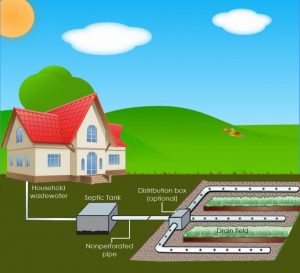Sewer system vs Septic Tank system
We are all used to the public sewer system that has been in place for many years in the urban areas. Now on the rise is the septic tank system which is mainly used privately. Each system has its pros and cons which we are going to look at in this article.
 Costs
Costs
As far as costs are concerned, with the sewer system you pay connection fees and monthly rates. Its another story for the septic tank though, where you pay for construction and regular pumping. So when making the decision on which system to choose consider also the rates of the area and compare to the costs of a septic tank system. In addition is the fact that the sewer system is the city council’s responsibility whereas the septic tank is your responsibility.
Management
The treatment facility for the sewer system is central and off site. The septic tank system however has its treatment facility on site therefore extra care should be taken when managing it.Sewer can handle large amounts of precipitation which the septic tank may not be able to handle. Take into account also that with the former, the council can cost effectively manage large volumes of waste whereas the size of the septic tank will determine its capacity. It is therefore imperative to consider this when deciding on the waste management system.
Important facts to note
The septic tank means you will have to look after it for the sake of the environment, this means you have to check the soil type. The soil must be porous to allow the soak away to work properly and the water table must not be high. There is need for the septic tank to be pumped out periodically to avoid clogged filters. Bear in mind that the septic tank should be 30 meters away from any water source and 10 meters away from any structure.
This system should be constructed on the downward slope by a professional team who have the know how and expertise. Its important to choose the size of your septic tank according to the population that will be using it. Remember to have it cleaned every now and then to avoid clogging.
Picture Credit: Direct Inspections
